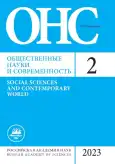编号 2 (2023)
Social philosophy
Modern West-Russia confrontation as a stage of the clash of civilizations and its peculiarities
摘要
 7-20
7-20


Articles
Ukrainian nationalism in the first half of the XX century as a variant of nazism
摘要
 21-38
21-38


The role of J. Basanavičius in the making of lithuanian nationalism
摘要
 39-55
39-55


J. Biden’s Green agenda: slogans and realites
摘要
 56-71
56-71


EU-Russia economic relations in conditions of restrictions
摘要
 72-89
72-89


Adaptation of russian small business to COVID-19 pandemic shocks: the first evidence of a longitude
摘要
 90-110
90-110


Opportunities and achievements in the field of education in Russia and the Visegrad countries
摘要
The dynamics of inequality of educational achievements and opportunities in school education in Russia and the countries of the Visegrad group are studied. The study is based on the data of the “International Program for the Assessment of Educational Achievements of Students” (PISA) for 2003-2018. The methodology for assessing the inequality of possibilities is based on a parametric approach and ex-ante determination of the equality of possibilities. Research novelty is determined by the fact that an assessment of an important component of the inequality of educational achievements - the inequality of opportunities - is carried out. The idea of dividing inequality into unfair and fair components is justified within the framework of the theory of equal opportunities developed by Western social philosophy in the second half of the XX century. The completed calculations indicate that each of the countries under consideration is unique. The most problematic are Slovakia and Hungary, which have a downward trend in the average level of educational achievements and a high level of inequality of opportunities. Poland looks the most successful with an increase in educational results and a decrease in inequality of opportunities. In the Russian Federation there is an upward trend in reading and mathematical literacy, while natural science literacy stagnates. The level of inequality of opportunities in the Russian Federation is relatively low with a slight downward trend.
 111-128
111-128


Eurasian integration in the new geopolitical realities
摘要
 129-140
129-140











